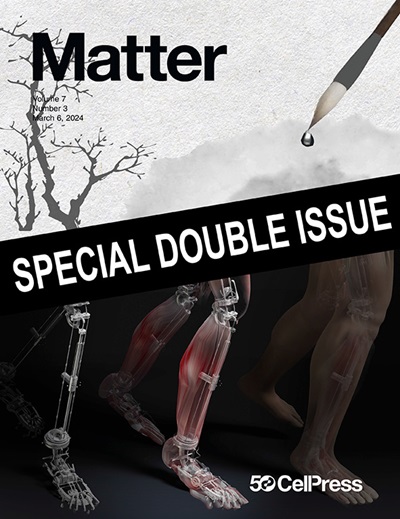声子超材料与高超声速激波/边界层相互作用的稳定性
IF 17.5
1区 材料科学
Q1 MATERIALS SCIENCE, MULTIDISCIPLINARY
引用次数: 0
摘要
高超音速飞行可以彻底改变商业运输、国防和太空探索。然而,高超声速飞行器面临严重的流动干扰,这些干扰会产生高温和声载荷,从而降低其结构完整性。在这项工作中,我们研究了声子超材料(PMs)作为稳定这些干扰的新方法。pm是一种具有频率范围的工程材料,称为带隙,在这个频率范围内,波的传播明显受到抑制。我们的研究结果表明,这些带隙有效地减轻了高超声速激波/边界层相互作用(SWBLIs)中的不稳定性。具体来说,我们分析了暴露在7.2马赫气缸诱导的SWBLI下的双层PM地下,并将其性能与刚性壁面控制进行了比较。光谱分析表明,PM选择性地衰减干扰,并显著稳定远离流体-PM界面的流动结构。这些结果突出了pm作为增强高超声速飞行器弹性和实现可重复使用高超声速系统的变革性技术,为更安全,更有效的高超声速飞行铺平了道路。本文章由计算机程序翻译,如有差异,请以英文原文为准。

Stabilization of hypersonic shockwave/boundary-layer interactions with phononic metamaterials
Hypersonic flight can revolutionize commercial transport, defense, and space exploration. However, hypersonic vehicles face severe flow disturbances that can degrade their structural integrity by generating high temperatures and acoustic loads. In this work, we investigate phononic metamaterials (PMs) as a novel approach for stabilizing these disturbances. PMs are engineered materials that exhibit frequency ranges, known as band gaps, where wave propagation is significantly inhibited. Our findings show that these band gaps effectively mitigate unsteadiness in hypersonic shockwave/boundary-layer interactions (SWBLIs). Specifically, we analyze a bilayer PM subsurface exposed to a Mach 7.2 cylinder-induced SWBLI, comparing its performance to a rigid wall control. Spectral analysis reveals that the PM selectively attenuates disturbances and significantly stabilizes flow structures away from the fluid-PM interface. These results highlight PMs as a transformative technology for enhancing hypersonic vehicle resilience and enabling reusable hypersonic systems, paving the way for safer, more efficient hypersonic flight.
求助全文
通过发布文献求助,成功后即可免费获取论文全文。
去求助
来源期刊

Matter
MATERIALS SCIENCE, MULTIDISCIPLINARY-
CiteScore
26.30
自引率
2.60%
发文量
367
期刊介绍:
Matter, a monthly journal affiliated with Cell, spans the broad field of materials science from nano to macro levels,covering fundamentals to applications. Embracing groundbreaking technologies,it includes full-length research articles,reviews, perspectives,previews, opinions, personnel stories, and general editorial content.
Matter aims to be the primary resource for researchers in academia and industry, inspiring the next generation of materials scientists.
 求助内容:
求助内容: 应助结果提醒方式:
应助结果提醒方式:


